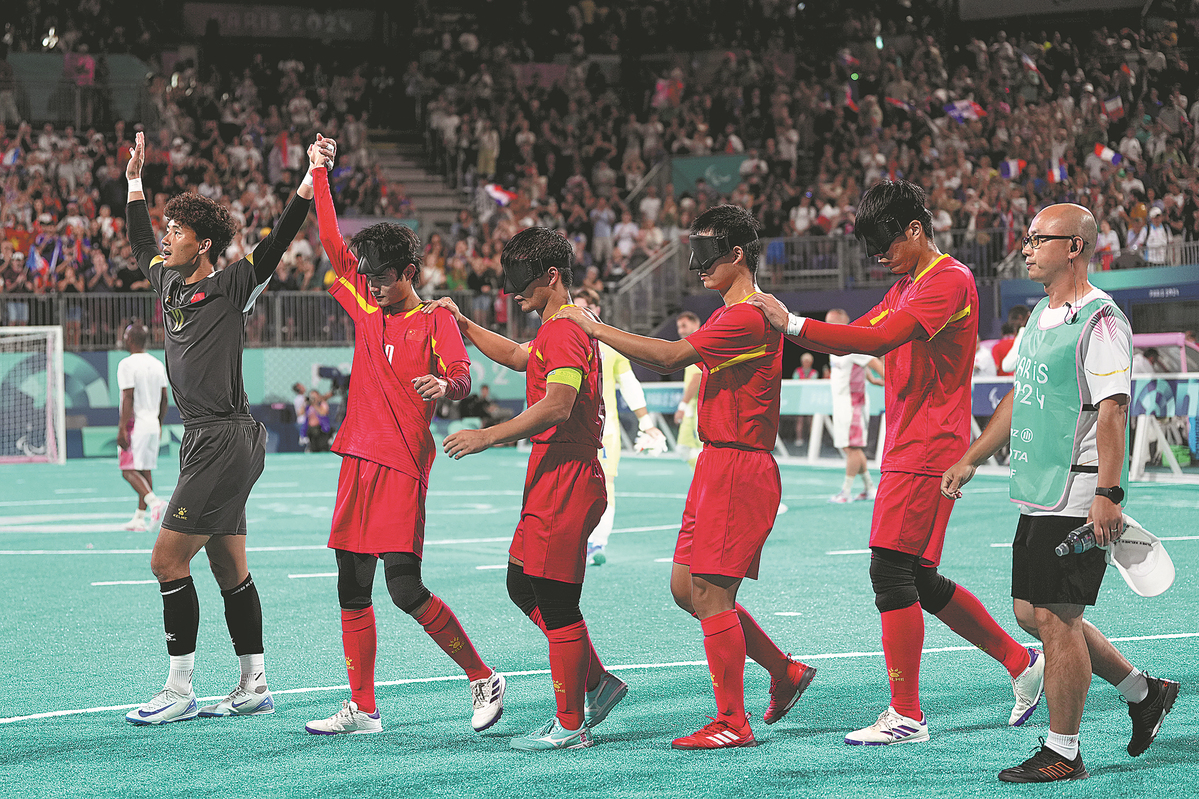Running on faith


Trust and understanding is crucial for visually impaired athletes and their guides
With each call from his coach Wang Lin, Di Dongdong pushed harder, sprinting down the rain-soaked purple track at the Stade de France in Paris.
As the final command echoed, Di leaped, tracing a graceful arc through the air.
His jump of 6.85 meters on Aug 30 not only secured him the gold in the 2024 Paris Paralympics men's long jump T11, but also shattered a decade-old world record.
"Breaking the world record has always been my goal," Di said. "The heavy rain, slippery track and chilly temperatures could have been setbacks, but today I achieved what I set out to do. I'm overjoyed."
Di was quick to acknowledge the vital role his coach played in his success. "Coach Wang is like my eyes," Di said. "With him guiding me, it's as if I've regained my sight, allowing me to run fearlessly and make that leap."
On the Paralympic stage, visually impaired athletes rely on sighted guides — whether coaches, teammates or designated assistants — to compete.
These guides act as the athletes' "eyes" — either running alongside them, leading from the front or offering support from behind.
Off the track, they are more than just partners in sport; they are friends, often as close as family. Together, they pursue the shared dream of pushing past their limits and achieving greatness.
In the long jump T11 category at the Paris Paralympics, where athletes are entirely blind, every jump is a leap of faith. Di relies solely on the voice of Wang, who stands at the front of the takeoff board, calling out to guide him.
With his eyes covered by a blindfold, Di gauges his direction and pace through the rhythm of Wang's shouts, adjusting his stride and timing his leap with precision.
Wang explains that he uses the word "lai (come)" because it's the loudest and clearest command he can give.
"I don't have a set number of times I shout it," Wang said. "I just match his rhythm, adjusting the pace of my calls as he runs."
This flawless partnership is the result of years of trust and countless hours of practice. In the darkness of uncertainty, Di and Wang's connection has been honed over 14 years, a testament to their unwavering dedication and mutual understanding.
Long jump, a sport that demands explosive power and precise technique, presents an even greater challenge for visually impaired athletes.
For these competitors, the risk of injury is heightened, as they rely on guides to navigate the sand pit's position, depth and length.
"This skill is developed over many years," explained Wang, "While an able-bodied athlete might need around 1,000 jumps to perfect their technique, a blind athlete can require up to 10,000 to achieve the same level of proficiency."
Wang elaborated: "Imagine trying to walk blindfolded — you'd likely struggle to maintain a straight line. Di's mastery of the long jump took five years of intensive training. His dedication is extraordinary."
In addition to the long jump, Di also took bronze in the men's 100m T11 and contested the men's 400m T11 track events at the Paris Games. He acknowledges that these races present their own set of challenges, particularly in overcoming mental barriers.
"Initially, I lacked focus and confidence. It took rigorous and consistent training to build my skills and self-assurance," Di said.
"I train for four to five hours a day for both events."
Even though Di has secured gold medals at the past two Paralympic Games, the 31-year-old athlete believes he still has more to offer, and Wang remains steadfast in his support.
"As long as Dongdong is training, I will be there to guide him," Wang said. "Our partnership will continue."
Most Popular
- Wuhan Open welcomes 'Queen Wen' Zheng Qinwen
- China's Sun first to beat 10,000-point mark in ITTF world rankings
- Wuhan Open: China's Yuan Yue, Wang Xinyu both advance
- Shang is starting to make a racket among the ATP elite
- It's a family affair as LeBron, Bronny James make history
- Master of Shanghai: Fans flood Djokovic with love































